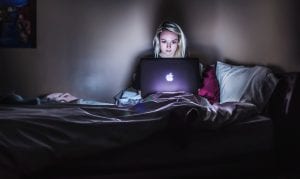Take each day as it comes and try to live and be in the present. Focus on the things within your control and protect your space as much as possible.
Staying physically and mentally fit is a challenge during this period, as many are not acquainted with being confined at home as necessitated by the global pandemic. The transition may be easy for some, and for others, the change in routine upsets their personal and work-life balance. It is safe to say that a lot of people are affected mentally by the coronavirus crisis, and the feeling of anxiety, worry, stress, fear, tension, and being overwhelmed is entirely normal. Social distancing, as necessary as it is, only brings about feelings of disconnection and isolation, which ultimately disrupts the wellness of your mental health. Here are five ways to look after your mental health while staying at home:
- HAVE A ROUTINE
It is great to have a set time for sleep and work because it is so easy to have your whole jumbled up with random tasks. Schedules create a sense of normalcy, and it has to be deliberate to be effective. Adults need a good seven to nine hours of sleep every night, but being stressed out and anxious may make this difficult to achieve. Prioritize good sleeping habits and healthy eating as it might be easier to indulge in junk food and engage in stress-eating, which is potentially harmful. Do the needful; in this case, it may involve switching off your phone, turning off the TV, or taking a warm bath. Avoid using your phone at night as the light emanated suppresses the sleep hormone, melatonin, which regulates the sleep-wake cycle.
You could also expose yourself to sunlight in the morning because research suggests that it improves your sleep quality and duration. Training your mind to follow a proper schedule helps you focus and stay on track.
- TRY TO KEEP FIT
Having a healthy mind is just as important as having a healthy body. Maintaining your physical health is one of the ways to be healthy mentally. Exercising at home can be tedious for most because they have to do it all alone, but there are lots of options such as home cardio workout videos on YouTube to create that sense of connection and togetherness. Physical exercises cause the release of endorphins, which trigger a positive feeling in your body and boost your mood, thereby lowering the feeling of depression. You could also engage in mindfulness exercises or better still, meditation where you try to clear your mind and put it at ease. Self-care is extremely effective in managing stress and anxiety while isolated. An approach to it would be to give your body a treat by engaging in skin and body care routines that would make you feel refreshed and re-energized. Others might see it as engaging in programs and strategies to support their progress. Whichever way you choose to interpret self-care is excellent as long as your overall mental health is significantly improved.
- CONNECT WITH PEOPLE
Having a sense of connection with your loved ones increases your level of emotional well-being and provides a good support network for isolation. When you feel sad, anxious, or overwhelmed, having someone to reach out to helps to alleviate those feelings. Through video calls and messages, social media platforms allow people to provide emotional support and share their experiences. Part of those virtual forums are Zoom, House-party, FaceTime, Microsoft Teams, and Skype. Some platforms are also available to find fellow enthusiasts online for particular hobbies/interests and others as support groups to help with virtual counseling and one-on-one sessions with health and wellness practitioners.
- STIMULATE YOUR MIND
Lots of people are using this period to feed their passion and learn new things like a language, or how to play a musical instrument; you could also discover a new hobby. For others, this is the time to rediscover old skills or complete forgotten projects. Continuous learning boosts self-esteem and encourages social interaction. You could engage in something that challenges you, such as starting a blog or a new DIY project in the house. Furthermore, listening to podcasts and audiobooks increases your intellect and broadens your imagination.
Some online schools have made their courses free during this pandemic, and there is no better time than now to select the courses that interest you. Participating in tasks that you enjoy keeps you focused and in good spirits. When you pick up a new skill, it helps your overall concentration level and elevates your confidence level.
More importantly, take time out to reflect and focus on the present. Try out different relaxation techniques or breathing exercises to help you feel calmer and gain perspective.
- LIMIT YOUR SCREEN TIME

Woman using MacBook in bed; image by Victoria Heath, via Unsplash.com.
Social media has proven to be the escape for most people during this period of isolation and as tempting as it is to spend time refreshing news and gawking at the screen all day; it is unhealthy for the body and mind. Excess consumption of information does nothing to reduce the level of anxiety you may be feeling and can be a waste of productive time. No one is saying you should bury your head in the sand and be oblivious to what is going on; first, have a limit to the volume of information you consume every day. Secondly, ensure to tune to trusted news outlets, so you do not end up being stressed about bogus details and thirdly, try to keep a positive mindset always.
In conclusion, take each day as it comes and try to live and be in the present. Focus on the things within your control and protect your space as much as possible. Identify patterns of thoughts and sensations that keep you on edge and amplify your distress; avoid situations that put you there. You can not control everything life throws your way, but you can control how well you take care of yourself.


Join the conversation!